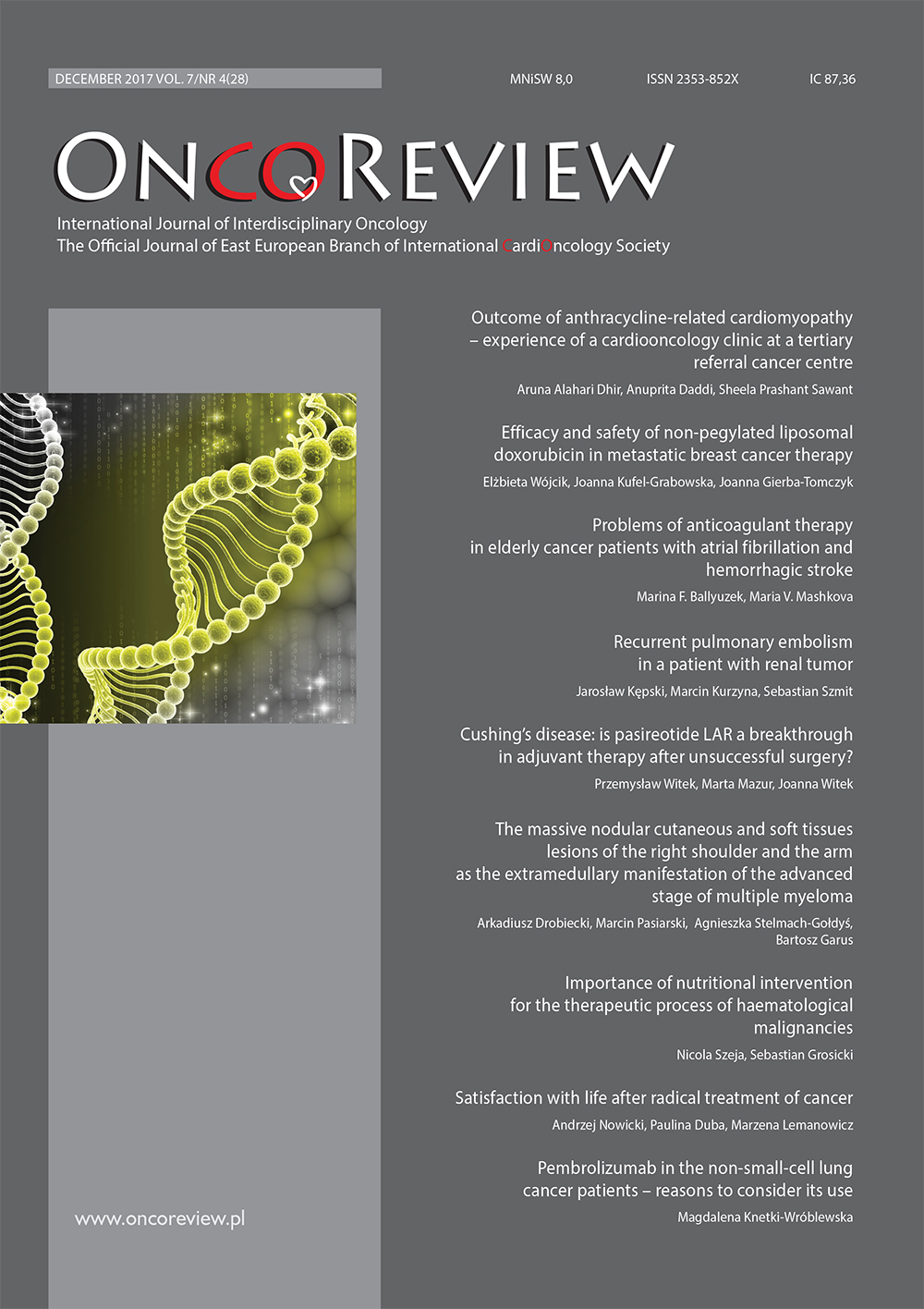Satisfaction with life after radical treatment of cancer Original article
Main Article Content
Abstract
Introduction: Cancer treatment is multidisciplinary in its character and places a heavy burden on the patient. Quality of life is a concept that is closely related to the satisfaction with life. Cancer patients’ satisfaction with life, especially after recovery, is an increasingly examined indicator of treatment quality.
Aim of the study: Evaluation of satisfaction with life in patients after radical cancer treatment.
Material and methods: The study included 100 people, 81 women and 19 men of all ages, following radical treatment of various cancers. The study was conducted in 2016 at the Centre of Oncology in Bydgoszcz. The study used the Satisfaction with Life Scale (SWLS), adapted by Z. Juczyński, as well as a sociodemographic data questionnaire.
Results: In general, cancer patients have an average level of satisfaction with life – the average score was 22.37 and 6.19 sten. The greatest satisfaction with life (average points) was reported for professionally active people – 22.67, patients between 41–50 years old – 23.5, patients with secondary education – 23.4, and patients with at least one child – 22.73, though the differences were not statistically significant. Additionally, patients 3–5 years after treatment declared a higher satisfaction with life – 23.05, as did patients without concomitant diseases – 22.77, though again the results were statistically non-significant.
Conclusions: In general, patients after radical anti-cancer treatment have an average satisfaction with life, and in half of them satisfaction with life is high, regardless of the duration and type of cancer. Sociodemographic factors have no impact on the satisfaction with life scores.
Downloads
Metrics
Article Details

This work is licensed under a Creative Commons Attribution-NonCommercial 4.0 International License.
Copyright: © Medical Education sp. z o.o. This is an Open Access article distributed under the terms of the Attribution-NonCommercial 4.0 International (CC BY-NC 4.0). License (https://creativecommons.org/licenses/by-nc/4.0/), allowing third parties to copy and redistribute the material in any medium or format and to remix, transform, and build upon the material, provided the original work is properly cited and states its license.
Address reprint requests to: Medical Education, Marcin Kuźma (marcin.kuzma@mededu.pl)
References
2. Jachimowicz V, Kostka T. Satysfakcja z życia starszych kobiet. Ginekol Prakt 2009; 3: 27-32.
3. Juczyński Z. Narzędzia pomiaru w promocji i psychologii zdrowia. Pracownia Testów Psychologicznych Polskiego Towarzystwa Psychologicznego, Warszawa 2001.
4. Winiarski M, Jóźwiak D, Pusty M, Dziki A. Satisfaction with life after rectal prolapse surgery. Pol Prz Chir 2013; 85: 29-34.
5. Diener E. The satisfaction with life scale. J Pers Asse 1985; 49: 71-75.
6. Motyka M, Dziubak M, Patrycja J. The sense of coherence and the quality of patients treated for breast cancer. Przegl Lek 2014; 71: 270-273.
7. Nowicki A, Marciniak J, Farbicka P, Banaszkiewicz Z. Satisfaction with life and disease acceptance by patients with a stomy related to treatment of the rectal cancer – determinants of quality of life? Pol Prz Chir 2015; 87: 434-442.
8. Syska-Bielak A, Jarząb M, Kropińska A et al. Zasoby pozytywne: poziom nadziei i satysfakcja z życia, u pacjentów leczonych w dzieciństwie z powodu zróżnicowanego raka tarczycy. Współcz Onkol 2010; 14: 5-8.
9. Diener E, Lucas RE, Oishi S. Subjective Well-Being. The science of happiness and life satisfaction. W: Snyder CR, Lopez SJ (ed): Handbook of positive psychology. Oxford 2002; 63-73.
10. Kanadys K, Lewicka M, Sulima M et al. Analiza poziomu satysfakcji z życia kobiet w okresie okołomenopauzalnym zależnie od wybranych czynników socjodemograficznych. MONZ 2014; 20: 42-45.

